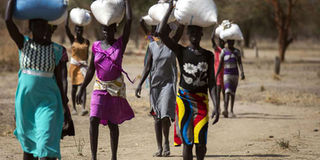An elegy for women, children of S. Sudan

Women carry food in gunny bags after visiting an aid distribution centre in Ngop in South Sudan's Unity State on March 10, 2017. As the conflict in S. Sudan continues, more women are exposed to inhuman abuses such as rape. PHOTO | ALBERT GONZALEZ FARRAN | AFP
What you need to know:
- An adolescent girl in South Sudan is three times more likely to die in childbirth than to complete primary school.
- Kenya has for the longest time been the big brother of the East and Horn of Africa.
One of the greatest joys in my job is working with young African women, who are full of ideas and bristling with promise, potential and confidence.
The Great Debaters contest I support gives African girls a platform to showcase their potential and this fills me with hope for our continent and our gender.
But recently this hope was punctured by a sobering reality when I discovered that in South Sudan, only 500 girls made it to the final year of high school in 2013.
Indeed, according to the UN, an adolescent girl in South Sudan is three times more likely to die in childbirth than to complete primary school.
SEXUAL VIOLENCE
This is an indictment against our leaders and undermines the standards to which we should all hold ourselves accountable.
Further research only reveals more painful realities for the women and girls of South Sudan.
Since the outbreak of civil conflict in December 2013, they have been subjected to what the UN calls “unspeakable” sexual violence, with rape increasingly used as a weapon of war.
A UN survey found that three out of every four women who had sought protection in UN camps had experienced conflict-related sexual violence, and around the same number had been forced to watch as someone else was abused.
ADDRESS WOMEN'S PLIGHT
What have these women who have never shirked their communal responsibilities to fetch firewood, till the soil and nurse their young done to deserve this brutal and humiliating treatment?
It seems lost to our collective conscience that these girls who have been denied education and safety and exposed to the horrors of war, will in a few years become the women in which South Sudan will have to vest its hopes for the future.
The women of South Sudan are trying their best to fight back.
This week, I spoke to Jacky Mathiew from Unity State who was on her way to Addis Ababa to visit the African Union and call on them to act.
HELP GROUP
In 2014 Jacky was forced to flee her home in Mayom and seek refuge in a displaced persons camp.
After witnessing horrific sexual abuse of women and children at the hands of warring parties and experiencing such abuse herself, Jacky founded a women’s association that helps survivors of sexual violence, and campaigns for robust patrols in and around the camp.
Though Jacky has managed to turn her experiences into sources of strength and healing, other victims are not so fortunate and struggle to cope with the residual trauma with very little support.
CIVIL WAR
Despite a peace agreement signed in August 2015, the situation is not getting better.
Each day we wake up to reports of more fighting, more pillaging, more looting, more death, more cases of rape and more shattered dreams.
South Sudan is fast approaching the point of no return.
It is unfortunate that as the military and political elite of South Sudan continue to fight for power, the women who are the backbone of any nation, continue to suffer abuse and neglect.
It is even more depressing that there seems to be a clear lack of political will both inside and outside South Sudan to set up the basic justice and accountability mechanisms to provide respite for the victims and make it clear that Africa will not condone the barbaric use of rape as a weapon of war.
ENDING CONFLICT
As an African woman, I feel disturbed and challenged by the plight of the girl child in South Sudan.
When did we stop caring? Why aren’t we doing more?
Women like Jacky desperately need South Sudan’s neighbours to speak out and act now.
Kenya has for the longest time been the big brother of the East and Horn of Africa and we helped broker the peace agreement that birthed South Sudan in 2011.
Alongside Uganda, we hold the keys to ending the current conflict.
We need to use them, including by supporting the establishment of the Hybrid Courts provided for in the 2015 Peace Agreement.
We need to do this for the sake of future generations not just in South Sudan but the region.
Ms Gichuru is a media personality.




